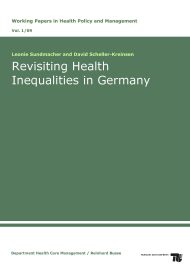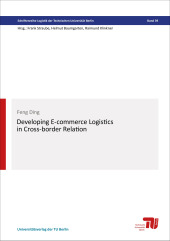Revisiting Health Inequalities in Germany

Format: 21,0 x 29,7 cm
Publishing year: 2009
Background: Our aim is a wide-ranging analysis of the determinants of health ine-qualities, which scrutinizes the propositions of the main theoretical approaches (ma-terialist or neo-materialist approach, cultural and behavioural approaches, psycho-social explanations, the life-course perspective and the newer capability approach) within one model thereby offering insights into their relative explanatory power. Methods: Using Fields’s (2004) regression techniques we decompose total variance into its factors and thereby generate insights about the contribution of specific vari-ables (and approaches) to explain health inequalities in Germany. Moreover, we stratify our sample by age and compare the contribution of each of the factors (con-stituting the different approaches) in four age groups. Data: The data is taken from the 2006 wave of the German Socioeconomic Panel (GSOEP). The GSOEP is a representative longitudinal study of private households and their members above the age of 16, which was started in 1984 and originally consisted of 12 000 individuals. We use the physical health scores derived from the 2006 GSOEP data wave as the dependent variable in our analysis. The scores are derived using an algorithm presented by Anderson et al., which is based on the 2004 GSOEP data wave as the norm sample. Furthermore, we use a comprehensive set of covariates capturing information on demographics, socio-economic background, life-style, social capital, self-assessed stress levels, feelings of national belonging, insurance status and regional levels of pollution, crime, noise and provision of health care to test the relative weight of the theoretical explanations. Results: Overall, we find that understanding the mechanisms of health inequalities crucially depends on taking a holistic perspective on individual’s health. Socio-eco-nomic factors, working conditions and lifestyle independently, interacted and com-pounded explain variation in health in specific age-groups in our analysis. Studies which take a reductionist approach and do not allow for the possibility that health inequalities are generated by a complex co-action of many factors may forego in-sightful findings.



